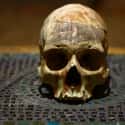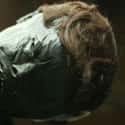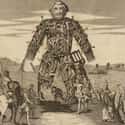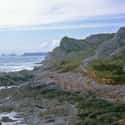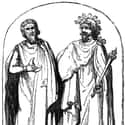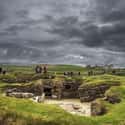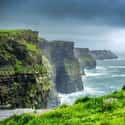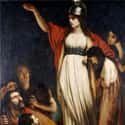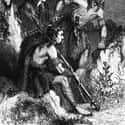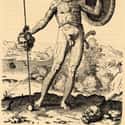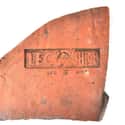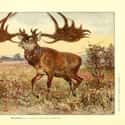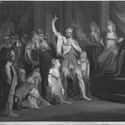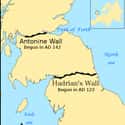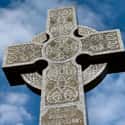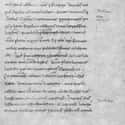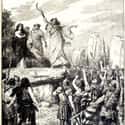-
(#1) The Ancient British Practiced Cannibalism
Artifacts found in a cave in Somerset, England, suggest that the people of prehistoric England were big-time cannibals. Human remains with bite marks, and carefully sculpted human skulls that look like bowls, suggest that the people of this area were eating their own dead. The practice seems to have been primarily practical—why let good meat go to waste? Primitive stone knives were used to carve meat and muscle from bodies, while bite marks were found on ribs and even toes.
-
(#2) Humans Were Murdered in Brutal Sacrifices
Well-preserved bodies found in bogs suggest human sacrifice in pre-Roman Britain. These bodies exhibit brutal wounds: one was hit so hard in the back of the head, skull fragments went into his brain and his teeth broke; his throat was then slit. Roman writings also attest to human sacrifice, though beyond descriptions of the physical killings, its unclear whether the Romans actually knew what they were talking about. -
(#3) "The Wicker Man" Is Real
Druids performed all manner of rituals in Britain, including, according to Roman sources, human sacrifice. One form of druidic human sacrifice entailed building a large, hollow man out of wicker, filling it with human tributes, and then lighting it on fire. Some scholars suggest Romans made up the part about the wicker man containing human sacrifices (seriously, wouldn't a giant structure made of wicker just collapse if filled with the weight of human bodies?) —the druids simply burned an effigy of a man as an offering to gods.
-
(#4) The Oldest Human Remains In Britain Are of a Young Shaman Covered in Red Paint
The Red Lady of Paviland (actually the remains of a young man covered in red ochre body paint, who was probably in his 20s when he died) are the oldest human remains yet found in Britain, at 34,000 years old. The Red Lady was buried along with various artifacts in a cave in Gower, Wales; the nature of the burial makes the site the oldest ceremonial burial ground in Western Europe. No one is sure who the Red Lady was, but many speculate he may have been a shaman or mystic.
-
(#5) It Took Twenty Years of Training to Become a Druid
Extensive written documentation of British history begins with the arrival of the Romans, whose records provide great information on the druids. As it turns out, the druids weren't weird magical people in hoods who stalked swamps, but rather educated citizens of pre-Roman Britain tasked with a number of important functions; they served as judges, teachers, philosophers, scientists, and religious leaders. According to information recorded by Julius Caesar, it took 20 years of training to become a druid, but to many it was worth the effort—druids didn't pay tribute to the nobles and weren't expected to participate in war.
-
(#6) Skara Brae: A Complete Ancient Settlement Older Than the Great Pyramids
In the 19th century, a giant storm tore through Orkney, an island off the northern tip of Scotland. The storm ripped open the earth, revealing Skara Brae, an ancient, neolithic settlement protected by sand and grass for thousands of years. A small cluster of ancient dwellings, Skara Brae contains intact beds, fireplaces, dressers, and even rudimentary cabinets, as well as smaller items like jewelry, tools, and games. The village was inhabited from about 3200 BCE until 2500 BCE, making it older than Stonehenge and the Great Pyramids. It is the most complete neolithic site in Britain. -
(#7) The British Islands Were Once Connected to Europe
Continuous, settled occupation of the British Isles began between 10,000 and 12,000 years ago. The migration of people from mainland Europe to southern England was aided by the fact that, at the time, Britain was part of the European landmass. Evidence also exists of a land bridge between Wales and Ireland, which might have aided migration from Britain to Ireland. Britain detached from mainland Europe after the last ice age, making migration more difficult, and Ireland most likely disconnected from Britain as many as 13,000 years ago, giving that country a radically different ancient history than Britain's.
-
(#8) Llanfairpwllgwyngyllgogerychwyrndrobwllllantysiliogogogoch
For the uninitiated, Welsh is a mind-boggling language rife with words without vowels, some so long, it's hard to believe they're real. For those familiar with Welsh, it's fun to root out the craziest Welsh words to show your friends. The Welsh language is of Celtic origins, which makes it very different from English, and even different from Scottish Gaelic (also a Celtic language, but a different branch). Fun place names in Wales include Bwlchgwyn, Ysbyty Ystwyth, and the now infamous Llanfairpwllgwyngyllgogerychwyrndrobwllllantysiliogogogoch.
-
(#9) A British Warrior Queen Slew 70,000 Romans
Boudica was a British queen whose husband, Prasutagus, a regional British king, did all he could to cozy up to the Romans when they arrived. Unfortunately, that did nothing to protect his family and their people from Roman cruelty—when Prasugatos died, Roman centurions enslaved his relatives and pillaged his kingdom. When Boudica objected to this treatment, she and her daughters were raped. In response, Boudica drummed up an army of loyal Britons and lay siege to Roman areas. It's estimated she killed as many as 70,000 Romans and their allies before her army lost to a more organized Roman force and Boudica poisoned herself. -
(#10) The Scottish Have Always Been Scottish
The culture and people of England has changed significantly over time, from the first writings of the Romans to present-day definitions of the English character. The Scottish, however, seem to have always been Scottish. As described by Roman general Tacitus, the Caledonians, or people of ancient Scotland, had red hair, large limbs, and were fierce and quick to fight. Sounds about right. -
(#11) The English: Odd Ones Out
Englishness is often confused for Britishness, at least outside the British Isles. Not many people who aren't British can tell you the difference between Britain, the United Kingdom, and the various countries of the British Isles. Yet, despite English dominance of the idea of Britishness and the British Isles, DNA tests show they're the odd ones out. Irish, Welsh, and Scottish people all share common ancestry, while the English exhibit a very different DNA makeup. This probably due, in part, to the Anglo-Saxon and Norman invasions of England.
-
(#12) Caligula's Seashells
In the first century AD, notorious Roman emperor Caligula began, but then abandoned, an invasion of Britain. He gathered the Romans on the beach and bade them collect seashells, which would signify that they conquered the sea, if not the land, of Britain. When news of this reached Rome, people thought that Caligula had lost his mind. As it turns out, the Roman word for seashell, musculi, is also slang for military equipment. So an alternate theory is, Caligula just told the boys to pack up, because they were going home. -
(#13) The Painted Ones Saved Scotland
Were it not for the Picts, war-like people of northern Britain, Scotland might not exist. Fierce warriors, the Picts were named "the painted ones" by the Romans on account of their war paint. On several occasions, the Picts defended Scotland from subjugation, first against the Romans, whose empire ended at the Scottish border, then against the Anglo-Saxons. Had the Picts not defeated the Anglo-Saxons at the Battle of Dunechtain, the Christian Anglo hoardes may have swept all the way to the northern tip of Britain, and turned the entire island into one country. -
(#14) The Mystery of the Ninth Legion
The Roman Ninth Legion, an elite fighting force, completely vanished from the annals of history in the second century AD, after arriving in Britain. The Ninth contained more than 5000 soldiers, so—what, they just disappeared?
Well, according to one theory, they marched north into the mists and mountains of Scotland to fight the Picts, never to be heard from again. According to another theory, they left Britain and were killed fighting the Persians. It's also possible they were simply decommissioned. There's not much evidence to support any of these theories, though the upheaval and violence of second century Britain was such that the Ninth may just have lost their lives somewhere in the Scottish wilds. -
(#15) Giant Deer and Hairy Rhinos
Prehistoric Britain was home to some crazy animals, including Irish elk, which stood about as tall as a moose and had massive antlers with a span of 13 feet or more. These animals towered over the relatively short people inhabiting Britain at the time, and weighed up to 1500 lbs. If you were trotting about Britain during the Ice Age, you also may have run into a wooly rhinoceros, which is exactly what it sounds like. -
(#16) The Story of Brave Caractacus
Caractacus was a British prince at the time of the Roman invasion. When his father died, he became king, and took up armed resistance against the Romans. Despite vastly inferior numbers, the army of Caractacus managed successful guerilla warfare against the Romans in the rugged terrain of Wales and nearby western England for nine years before their king was captured. The Romans were so impressed by Caractacus's success and bravery he was taken to Rome, met the Emperor, and granted a pardon. -
(#17) "Neither Terror nor Mercy Had the Least Effect”
As described in the Annals of Tacitus, the Romans had very little success conquering Wales. Unlike the people of lowland Britain, who lived in established communities and subsisted off farming, the Welsh lived in trecherous moutain territory, and were often nomadic. Like the fierce Caractacus, who led a rebellion against the Romans, the Silures people of Wales refused to give in to Roman advances, and could not be quelled, even when faced with horrific acts of violence. Tacitus suggested the only possible way to control Wales was to move in enough Romans to colonize the area and outnumber the locals.
-
(#18) The Antonine Wall: The Last Frontier
Hadrian's Wall, built upon the first Roman invasion of Britain, is often acknoweldged as the northern frontier of the Roman Empire. In fact, the Antonine Wall, built after and further north than Hadrian's Wall, holds that distinction. And, while Hadrian's Wall was more a symbolic marker than anything else, the Antonine Wall was erected to actually keep the Picts and Caledonians, war-like people of Scotland who gave the Romans hell, at bay. -
(#19) The People of Britain Were Never Celtic
The descriptor "Celtic" appears a lot in histories and cultural studies of Britain, and yet, as it turns out, Celtic is nothing more than a language family. The people of Britain were not any more Celtic than the people of Latin America are Spanish. In the 18th century, a theory arose among historians that a great Celtic, or Gaulic, invasion of Britain happened at some point in prehistoric times. It turns out this never happened. Instead, countless peoples migrated to Britain over a period of thousands of years, and some of those groups—those who spoke Celtic languages, for instance—happened to dominate others. -
(#20) 30,000 Years of Mysteries
The recorded history of Britain begins with the arrival of the Romans in 55 BCE. As we know from the Red Lady of Paviland, Britain was inhabited 30,000 years before this. Which means that several hundreds of generations of human history in the British Isles comes down to guesswork based on surviving artifacts. If nothing else, this means that not a single thing we know about pre-Roman Britain is certain; it might be very educated guesswork, but it's guesswork nonetheless.
-
(#21) The Historical Legacy of the Druids
Though the druids vanishes into the mists of history, they are part of more than one historical legacy. In Ireland, druids maintained their status and power until Christianity arrived. Though they lost their rights as religious leaders at this time, the druids survived as historians, judges, and poets, contributing to the storied history of Irish letters. It's also theorized that the druids descended from an ancient Indo-European priesthood, and are the western cousins of Hindu Brahmins from the Indian subcontinent.
New Random Displays Display All By Ranking
About This Tool
Many historical stories of the British Reformation have become the most famous history. Many books and film and television shows have performed various forms of interpretation and reproduction of the history before Christianity. British Christianity first originated during Roman rule. During the 7th century AD, the Catholic Church and Irish-Scottish missionaries once again introduced Christianity into Britain. In the Middle Ages, before Henry VIII founded the Anglican Church, the main belief of the British was the Catholic Church.
In different parts of the UK, especially in the northern part of England, the faith in the Catholic Church varies. Since the middle of the 17th century, various Protestant denominations have been founded. The random tool will bring us to know 21 crazy facts about Britain before Christianity.
Our data comes from Ranker, If you want to participate in the ranking of items displayed on this page, please click here.











